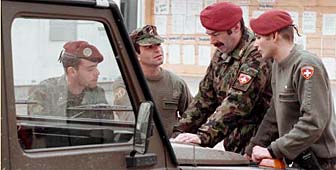Swiss soldiers demonstrate good conduct in war

The International Committee of the Red Cross has been hosting a special conference aimed at fostering a better understanding of humanitarian law in armies around the world. The Swiss army was asked to help get the message across.
The conference in Geneva was attended by the armed forces training chiefs from 21 countries, ranging from China to Namibia, El Salvador to Uzbekistan. Its aim was for the generals to share ideas and experiences about how to teach humanitarian law to their troops.
The ICRC says the humanitarian dimension of military operations is becoming increasingly important since more and more soldiers are taking part in peacekeeping operations.
“There is a lack of knowledge about what’s acceptable and what isn’t. Perhaps not with the armies represented here, but certainly in many armies,” ICRC spokesman Chris Bowers told swissinfo.
A key part of the conference was a field demonstration by the Swiss army at its training ground at Epeisses in canton Geneva. The troops staged three scenarios to illustrate the humanitarian challenges a soldier could expect to face.
The first dealt with how to behave towards wounded enemy soldiers and prisoners in a combat situation. The second showed how to react when the enemy uses a white flag and offers to negotiate, and when it reneges on a ceasefire. The third outlined the rules of engagement when confronted by civilians.
“Here we tried to show, at a company level, that you can include the law of armed conflict or international humanitarian law in the framework of normal combat training,” says Major Peter Hostetler of the Swiss army.
“It’s important that soldiers learn combat and humanitarian rules at the same time, because that’s how it will happen in a real life situation,” he added.
Chris Bowers says that the Swiss army approach is more likely to leave an impression on soldiers: “The way these laws are taught is often boring. Basically, there’s a lecture to 500 people who have just finished their manoeuvres, they’re often tired and probably not listening.”
“What we’ve been able to witness here is a real-life simulation of what might happen in a war, and where the line is drawn between what you’re allowed to do and what you’re not allowed to do,” he says.
The clear message being given to the watching generals was that it is possible to stay within the rules of war, and still remain credible and efficient – not only in wartime, but also when troops are involved in peacekeeping missions.
“We certainly have learned a lot,” says General Munir Hafiez, head of military training for the Pakistani Army. “We participate regularly in United Nations peacekeeping operations and we already have a training programme for this in our army, and we do educate our troops on how to conduct themselves when involved in such conflicts.”
“Over the past few days, we’ve exchanged views with other armies and the ICRC, and it has been very useful. When we get back we will disseminate everything to our army and also include it in our syllabi,” the general said.
It’s that kind of attitude that the ICRC and the Swiss army want to encourage, so that should these countries go to war, their servicemen will respect the right of their enemy and civilians.
The foreign visitors seemed very receptive to what the Swiss army had to say to them. “We are well-placed to teach these principles because of our neutrality and because of our strong commitment to humanitarian law,” says Major Hostetler.
“It’s easier to accept it if the Swiss army is staging such an exercise, than if it’s a country with which you have a problem. We are not anybody’s enemy,” he says.
by Roy Probert

In compliance with the JTI standards
More: SWI swissinfo.ch certified by the Journalism Trust Initiative









You can find an overview of ongoing debates with our journalists here . Please join us!
If you want to start a conversation about a topic raised in this article or want to report factual errors, email us at english@swissinfo.ch.